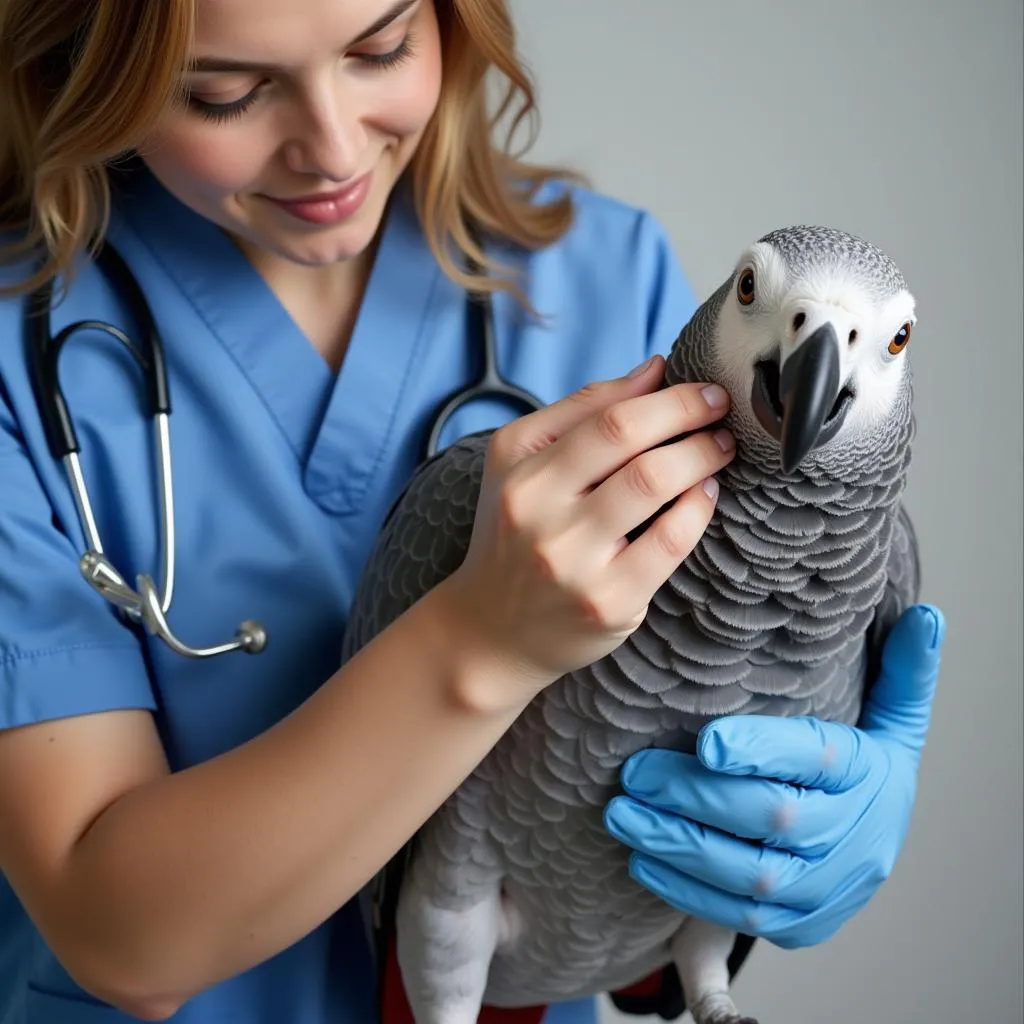Decoding Your African Grey’s Anger: Why Your Parrot is Upset and How to Help
African grey parrots, renowned for their intelligence and ability to mimic human speech, are captivating companions. However, beneath their playful antics and impressive vocabulary, these sensitive birds can sometimes display anger, leaving owners perplexed. Understanding the reasons behind your African grey’s anger is crucial for maintaining a happy and healthy relationship with your feathered friend.
Understanding the Language of an Angry African Grey
African greys, like humans, communicate their emotions through various cues. While they may not throw tantrums in the traditional sense, they have subtle ways of expressing their displeasure. Recognizing these signs is the first step in addressing your parrot’s anger:
- Biting: While not always an indicator of anger, a sudden increase in biting frequency or intensity can signal frustration or stress.
- Feather Plucking: This self-destructive behavior can be a sign of boredom, anxiety, or even medical issues.
- Screaming: Prolonged or excessive screaming, especially if it’s out of character, can be a cry for attention or a sign of distress.
- Wing Flipping: Rapidly flapping wings accompanied by agitated movements can indicate frustration or a desire to escape the current environment.
Common Triggers of Anger in African Greys
Identifying the root cause of your parrot’s anger is paramount in resolving the issue. Here are some common culprits:
- Environmental Factors: Changes in their surroundings, such as a new cage, a move to a different room, or even a shift in the household routine, can cause stress and anxiety.
- Dietary Deficiencies: An unbalanced diet lacking essential nutrients can negatively impact your parrot’s mood and overall well-being.
- Lack of Mental Stimulation: African greys are highly intelligent creatures that thrive on mental challenges. A lack of enrichment activities can lead to boredom and frustration.
- Health Issues: Underlying medical conditions can manifest as behavioral changes, including increased anger and aggression.
 African Grey Parrot Showing Aggression
African Grey Parrot Showing Aggression
Addressing Your African Grey’s Anger: A Step-by-Step Guide
Once you’ve pinpointed the potential triggers, you can begin to address your parrot’s anger and create a more harmonious environment:
- Rule out Medical Conditions: Schedule a check-up with an avian veterinarian to eliminate any underlying health issues that could be contributing to the behavioral changes.
- Environmental Enrichment: Provide ample opportunities for mental stimulation through interactive toys, puzzle feeders, and regular training sessions.
- Dietary Evaluation: Ensure your African grey’s diet is balanced and nutritious, incorporating fresh fruits, vegetables, and high-quality parrot pellets.
- Positive Reinforcement: Reward desired behaviors, such as quiet play or stepping up on command, with praise, treats, or head scratches.
- Consistency is Key: Establish a predictable routine for feeding, playtime, and sleep to provide a sense of security and reduce anxiety.
 Happy African Grey Parrot Interacting with Toys
Happy African Grey Parrot Interacting with Toys
Seeking Professional Help
If your African grey’s anger persists despite your best efforts, consider seeking guidance from a certified avian behaviorist. They can provide tailored solutions and support in modifying unwanted behaviors.
Remember, building a strong bond with your African grey takes patience, understanding, and a genuine commitment to their well-being. By addressing their emotional needs and providing a stimulating and nurturing environment, you can foster a loving and lasting companionship with your feathered friend.
FAQs about African Grey Parrot Anger
Q: Is it normal for African greys to get angry?
A: Like all animals, African greys experience a range of emotions, including anger. It’s essential to understand the root cause of their anger and address it appropriately.
Q: Can I punish my African grey for being angry?
A: Punishment is counterproductive and can damage your bond with your parrot. Focus on positive reinforcement and addressing the underlying reasons for their behavior.
Q: How can I tell if my African grey’s anger is due to a medical issue?
A: Sudden changes in behavior, lethargy, loss of appetite, and changes in droppings can indicate a health problem. Consult an avian veterinarian if you suspect your parrot is unwell.
Q: My African grey is plucking its feathers. What should I do?
A: Feather plucking can have various causes, including stress, boredom, and medical conditions. A thorough veterinary checkup is crucial to rule out any underlying health issues.
 Veterinarian Conducting a Health Check on an African Grey Parrot
Veterinarian Conducting a Health Check on an African Grey Parrot
Need More Help?
Dealing with an angry African Grey can be challenging. If you need further assistance, feel free to contact us. Our team of avian experts is here to help. Call us at +255768904061, email us at kaka.mag@gmail.com, or visit us at Mbarali DC Mawindi, Kangaga, Tanzania. We are available 24/7 to address your concerns.
For more insights into African Grey care and behavior, explore our other informative articles on [link to relevant article] and [link to another relevant article].

